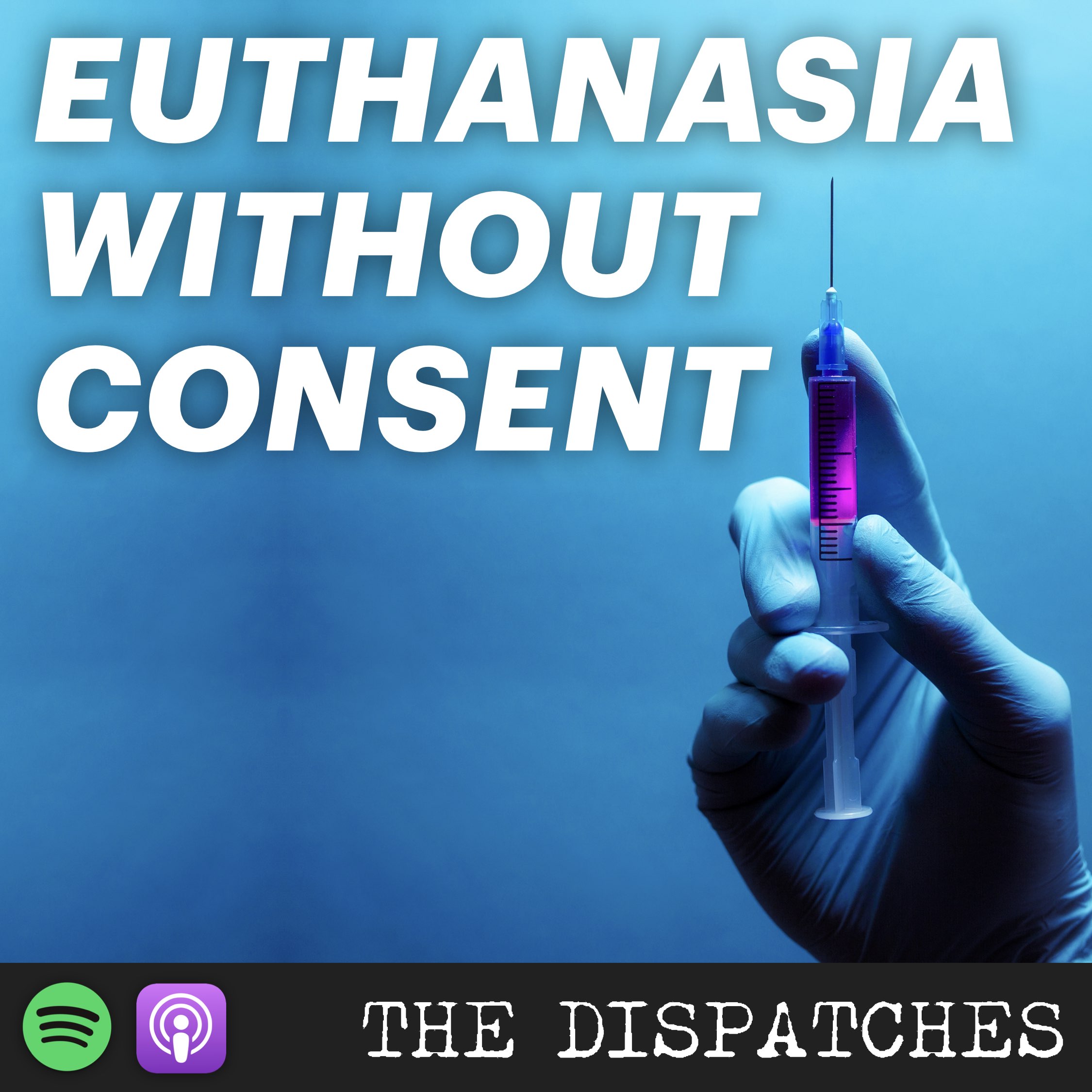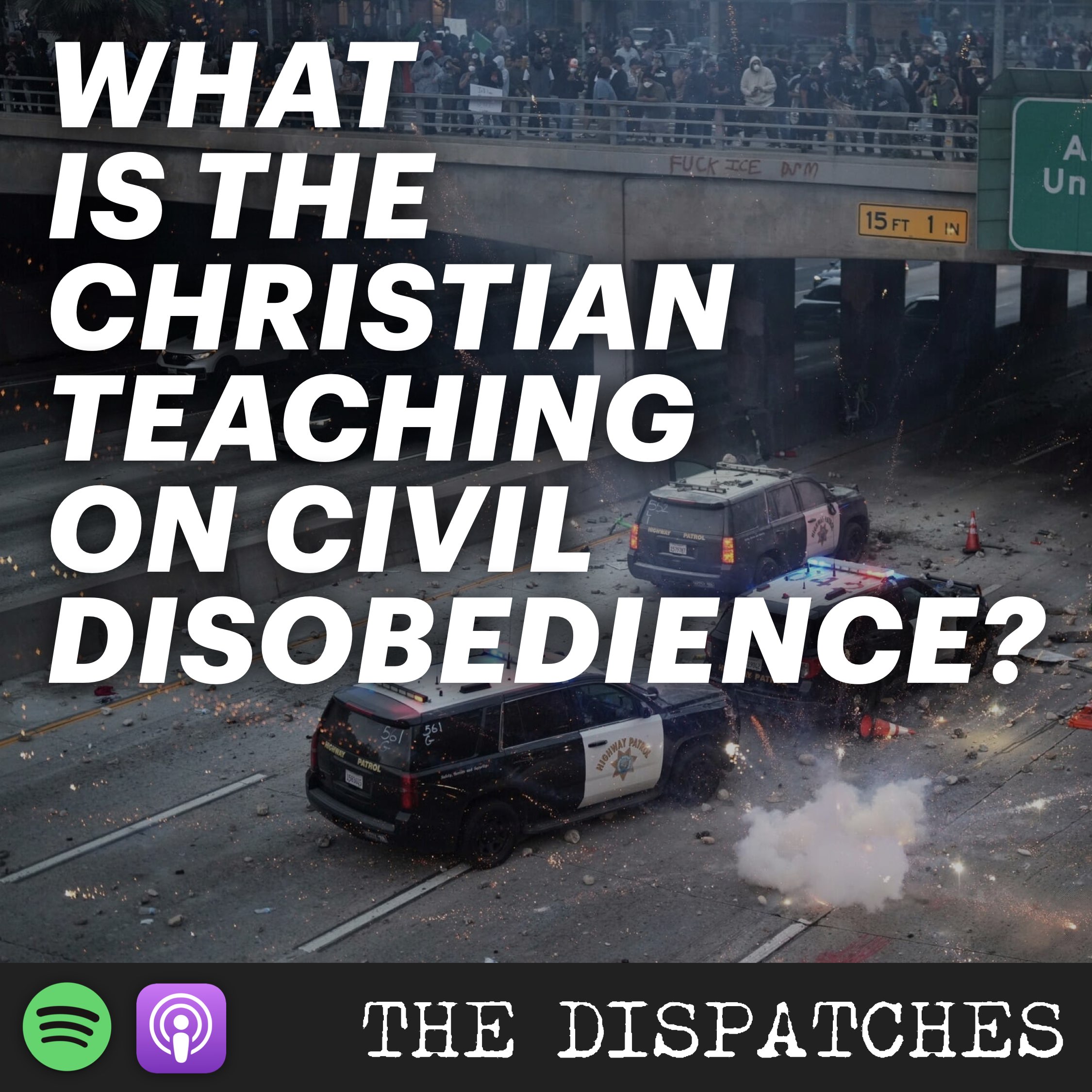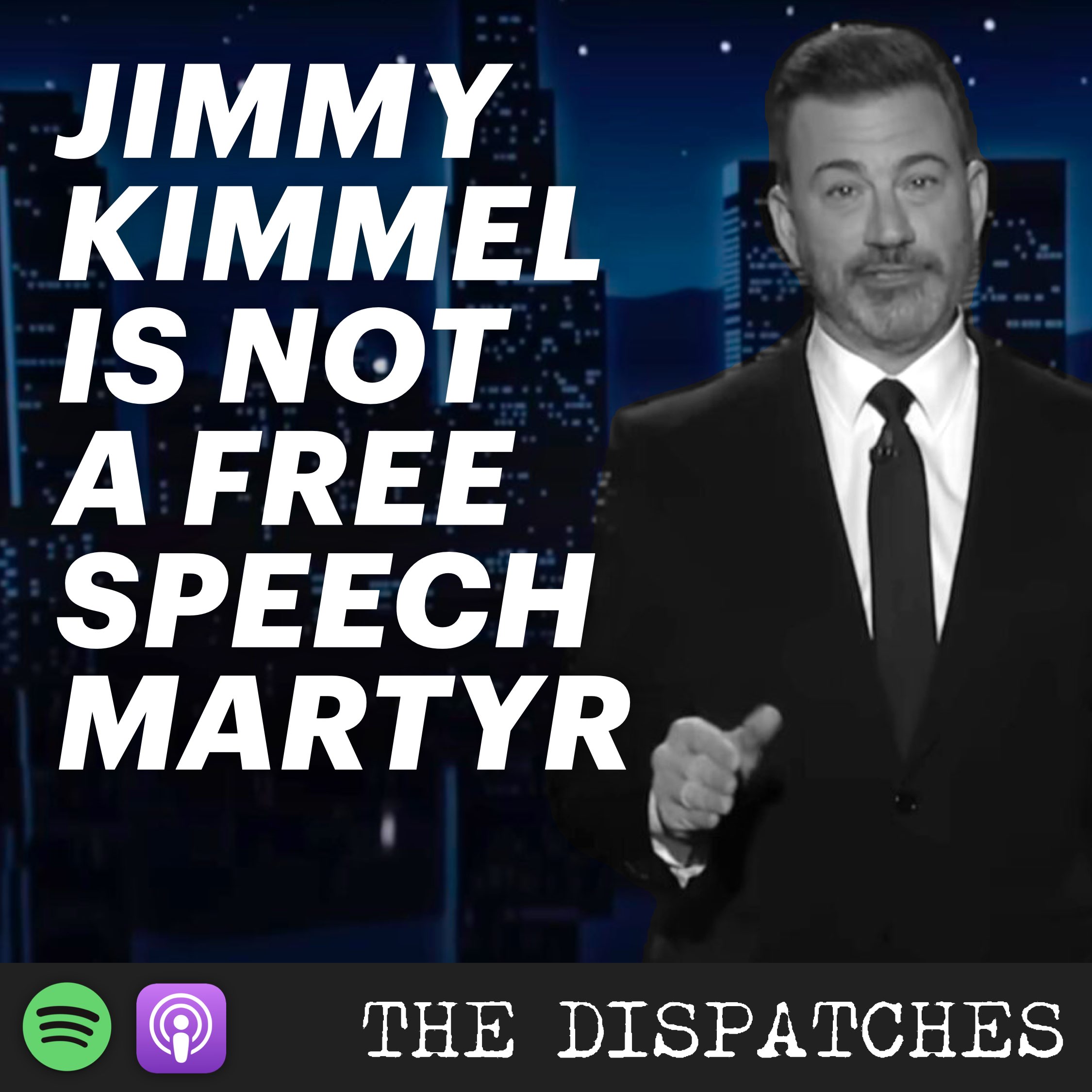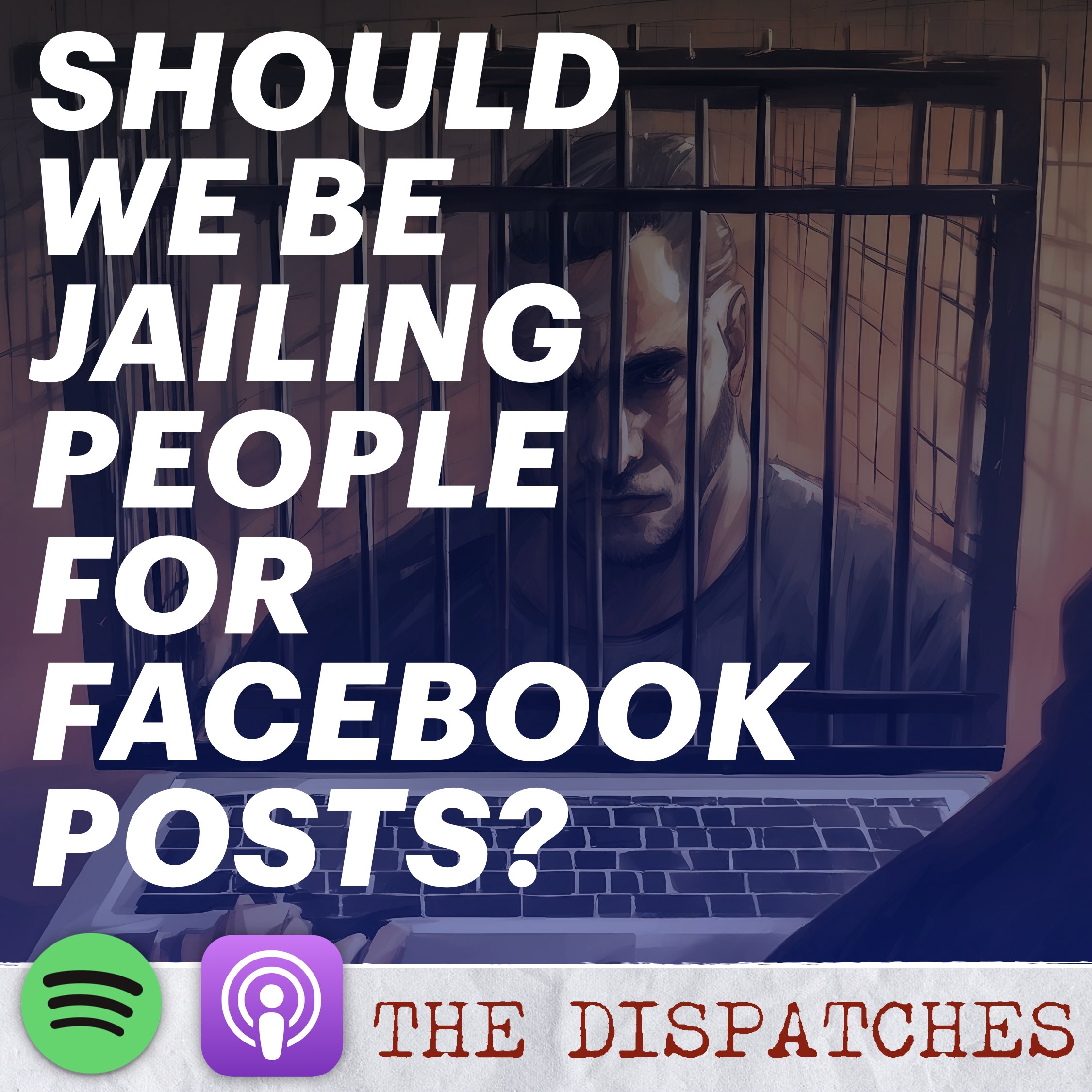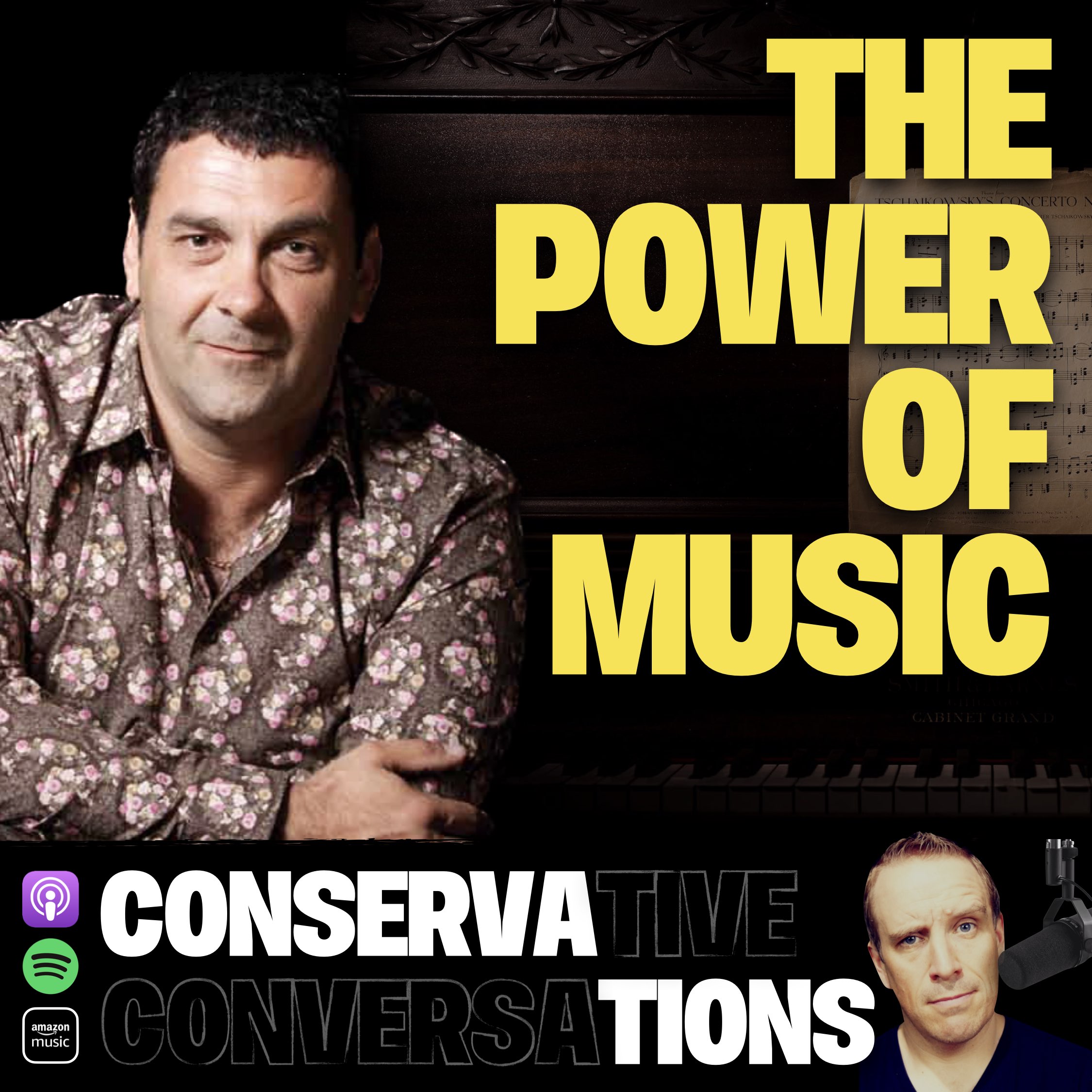[00:00:00] Hi everybody, welcome along to another episode of the Dispatchers podcast. My name is Brendan Malone. It is great to be back with you again and today's topic of conversation, Euthanasia Without Consent.
[00:00:15] Hi, my name is Brendan Malone and you're listening to the Dispatchers, the podcast that strives to cut through all the noise in order to challenge the popular narratives of the day with some good old fashioned contrarian thinking. You might not always agree, but at least you'll be taking a deeper look at the world around you.
[00:00:33] Thanks again for tuning in. If you're enjoying our work and you want to support everything that we do, not just the online stuff but also the offline activities as well, then you can do that by becoming a
[email protected] leftfootmedia or you can also support us with a monthly contribution via my Substack page.
[00:00:54] And also it's really helpful if you just share by word of mouth. If you find an episode or a piece of commentary that's been written to be quite enjoyable or helpful or insightful in some way, then please share and share alike. The more of that that happens, the better. A huge thank you to all of our patrons. It's thanks to you that today's episode is made possible and I will post links for both the Patreon page and also our substack page in the show notes for today's episode. Alrighty, today's topic of conversation, Euthanasia without Consent. Now, for some number of years, as many of you will be aware, I have been regularly speaking in public forums about life issues, and in particular respect for life issues, bioethics issues. And one of those big issues that I have been regularly asked to speak on is the issue of euthanasia. And this has been something that's been in my wheelhouse for almost 20 years now, actually.
[00:01:52] And in my presentations, one of the things that I try and do, particularly if I'm speaking to an audience that might be a little bit skeptical of the anti euthanasia position, or those who maybe aren't as aware regarding this issue, I try and present as many examples as I can cite of harms that we are now able to see and have been recorded in in jurisdictions around the world where they have legalised euthanasia and assisted suicide. And so wherever they've got reports of things that are harms, or where they have studies and research papers that are done which show you the various negative consequences in regards to that particular point, there is no jurisdiction that you can point to where there hasn't been harms. The simple rule of thumb is this, and it has never been violated, that wherever and whenever you legalise euthanasia, you will start harming vulnerable people. And in the worst case, the harm that you are inflicting upon those vulnerable people is their deliberate and premature death. And there is one infamous case from the Netherlands that took place a few years ago that I have been regularly highlighting in my presentations that involved an elderly woman who was diagnosed with dementia. And she signed an advanced care directive. And she said in her advanced care directive that. That what she wanted was for euthanasia when she felt the time was right.
[00:03:17] And over the ensuing months, as her condition progressed, she was asked by family and by medical professionals, was now the right time? And she kept indicating that, no, she didn't want euthanasia. So she'd said in her advanced care directive that she would choose it for herself when the time was right. And she kept saying no, that she didn't want euthanasia. The time wasn't right in her mind.
[00:03:40] Now, it got to the point where eventually the family and the doctor involved decided that in actual fact, they felt the time was right for euthanasia for this woman who was not consenting. And as I understand the facts of the case, in their mind, they thought that they were doing a good thing because they presumed that it was her mental cognitive decline that was causing her to say no to euthanasia and that if she had her faculties, she'd actually want to say yes to euthanasia. So they made the decision on her behalf. And you can see what's going on here, this perverse devil's arithmetic now, where they've completely flipped consent on its head. The only way that consent actually remains a barrier and a safety, protective measure is if, in actual fact, you don't do things to patients under normal circumstances. There are situations where you might have to invoke force majeure and. And override the normal requirements for the good of the patient. But those things are not the norm. And the norm is that you have to get consent before you conduct a therapy or you do any medical procedure upon a patient. But they've flipped this completely on its head now. And so what you've got here is an actual fact. They're saying they don't need consent at all, because. And the reason why they give. It's totally circular. The reason why they don't need consent is because the patient can't consent.
[00:05:03] And so it's absolutely diabolical. The whole protective mechanism of informed consent is completely corrupted at that point, and in particular in this case, you can really see the diabolical nature of what's going on here, because they are saying, on the one hand, the reason that our mother wants euthanasia is because she has got a condition that affects her cognitive abilities.
[00:05:26] And so she has requested this or put this on her advanced care directive as something she'd like in future, but because she sees a decline in cognitive abilities as a detrimental thing.
[00:05:38] And then when the cognitive impairment, or they deem the cognitive impairment to be reaching what they think is a deleterious level, and she's saying, no, I don't want this, they say, well, in actual fact, if she had her cognitive ability, she would consent. But the absurdity here, of course, is that if she had her cognitive ability, then surely she wouldn't consent because she would say, I. I don't need euthanasia. So there's no way to guarantee that this person is really actually having their wishes met. And that's leaving aside all the other issues that I'll talk about in just a minute, but there's a recent case that's made its way onto Twitter. At the start of July, a lady called Samantha Smith. And I should preface this by saying that it is possible that someone can lie online. We shouldn't be shocked by that. So there is a possibility that this is someone who is just a serial liar and who is just making this all up. What I'm about to read to you. However, I think the fact that they are a verified user who actually has their real name out and attached to this post would tend to lend credibility that this is probably someone who is telling the truth. However, there's no guarantee. So please keep that in mind as I read this to you. But here's what she posted at the start of July. A family member of mine is a nurse in Canada. They performed several assisted dying procedures at the care home they worked at before refusing to continue.
[00:07:03] In one case, the family of a mentally disabled man decided they wanted him to be euthanized. He didn't want to die, but my family member was legally forced to end his life. They held his hand while he told them, I'm hungry and I'm thirsty. The poor man didn't understand what was happening to him as he was pumped full of medication that would end his life. And my family member wept for the soul that was being lost unnecessarily.
[00:07:30] He wasn't terminally ill. He wasn't particularly old. He wasn't dying. He didn't want to die. But he didn't have a choice because his life was deemed dispensable by his family and the government gave them the power to end his life, regardless of his needs or wishes. And when my family member told their workplace that they wouldn't continue performing these procedures, that their conscience wouldn't allow it, they were told that it was their, quote unquote, legal duty as a nurse.
[00:08:00] They still refused.
[00:08:03] But not everyone will have the moral fibre or the bravery of my family member. The road to hell is paved with good intentions. And this is exactly what the Assisted Dying Bill opens the door to. It starts with choice and dignity. But suicide isn't only done when the patient wants it. And the countries where it is already legalised have shown us the grim reality. Now, I just wanna. Before I go any further in my podcast, I just wanna highlight one thing here that I think is worthy of our consideration. When she says the road to hell is paved with good intentions. So, in other words, this assisted Dying Bill is about good intentions. But can I say that this approach to moral philosophy is actually a major departure from the Western moral tradition. We didn't simply say that an action could be like, you could tell someone's intentions based solely on their desires. Like, they're claiming here a desire for choice for the patient. They're claiming here a desire for dignity.
[00:09:02] And that's their intention, and that was the real intention. But in actual fact, in order to guarantee and understand and properly discern exactly what something or someone. So in this case, it's a bill, and obviously the someones are the people who passed it and sponsored it and wrote the thing. The way to tell what their actual intentions are is by looking at the actual actions that are going to be carried out. Like, what are they engaging in? What will this bill allow people to engage in? So it's not enough to say, well, they just have a sentimentality that directs them towards compassion or they believe they are promoting dignity. Your actions are actually far more important in displaying to us what your real intentions are, because you can actually give a patient choice and you can actually satisfy dignity for a patient without having to kill them. So you don't even need to legalise euthanasia to actually satisfy such things.
[00:10:02] So the fact that this bill goes a whole nother step further and allows physicians to deliberately end the lives of their patients tells us what the real intention is.
[00:10:13] And so there wasn't ever a good intention here. There was a misplaced sentimentality that was attached to a very bad intention. And the bad intention is let's give physicians the legal power to kill their patients. And I think it's something worth highlighting because it's a common thing. I see where people aren't really thinking clearly about this whole question of how do I discern what a person's intentions are. It's not simply enough that they say, here's my stated desire. We have to look at what they're actually doing, what their actions are. And that gives us a much clearer picture of what the real intentions are. Cause as I said, if the real intention was simply dignity and it was choice, you don't need euthanasia to satisfy dignity and choice, et cetera. Now, the reason why I don't have any trouble at all believing that this is a real case and that this actually happened is because there are previous examples we can cite and not just that infamous case from the Netherlands that I talked about earlier. One of the things that's been happening in the Netherlands for a while now is that they have been running a research report, a government research report that's conducted every five years.
[00:11:21] And they do this to try and gain census data on all causes of death in the Netherlands so they can start to get a bit more of an accurate picture of all the causes of death and the total numbers of people who are dying from these different causes of death.
[00:11:36] Now, this also includes death from euthanasia. And what they do is they send out questionnaires to physicians and the researchers allow the physicians to respond anonymously. And so this gives them a bit more of a guarantee that they're going to get accurate answers because you can just state exactly what you've been involved with without fear of repercussion. And they do this to try and determine how many people are dying of different causes.
[00:12:01] Now, with the survey being totally anonymous, as I said, this means that they can generally get a greater clarity, or they are probably guaranteed to get a greater clarity about exactly how many euthanasia deaths are happening. Now, why I mention this survey and what's important about this five yearly study is that it also has a very specific and special category, another category, and it allows doctors to actually report whether they have ended a patient's life without the patient's explicit request. So in other words, they can anonymously report if they have killed a patient without the patient's consent. They have a category for this. It's called ending of life without explicit request. Now, the 2015 report, I've been using that in my presentations for quite some number of years now to highlight the gravity of what's actually going on. The 2015 report showed that there were 431 people who were killed without explicit request. 431 cases.
[00:13:08] And obviously this is something that's averaged out to be a yearly occurrence of ending of life without explicit request each year in the Netherlands. And people are sometimes a little bit shocked by this. People are sometimes even more surprised when I explain to them that the image they are seeing on screen and is actually a screenshot that I went and took directly from the Dutch government website. So they have like a statistics department and they also have an English translation version. It's a little bit harder to find. Now I actually went back a couple of years ago and it wasn't as easy to find. But originally when I took the screenshot there it was in black and white. It's on the government website and all I did was literally take a screen grab of what was on screen.
[00:13:50] So this is not someone engaging hyperbole. This is not someone who's just making stuff up or I've heard from a friend of a friend. This is what the government is reporting in the Netherlands. 431 cases of ending life without explicit request. Now the next five yearly report was published in 2021 and I am assuming that the reason it was delayed was because of COVID But the report published in 2021 found that the number of cases of ending of life without explicit request had now increased to 517 cases per year. It's roughly around the same percentage though of the total number of euthanasia deaths each year. So what this means is about 5% of the total number of euthanasia deaths each year in the Netherlands. The patient is being killed without their consent.
[00:14:42] Now I know some people listening are going to be truly mortified and you are right to be mortified by this, but you should not be shocked by this.
[00:14:51] The fact that a regime allows legalised euthanasia should not, it should not absolutely in any way shock us that this then results in a situation where doctors are killing their patients without consent.
[00:15:07] Why?
[00:15:08] Well, because what you've done here when you legalize euthanasia is you have literally handed to physicians now the power over life and death. Now some people might be listening and thinking, but Brendan, didn't doctors have the power of life and death? You know, previously, haven't they already wielded that power over patient? Well, not quite.
[00:15:27] Previously doctors wielded life giving powers.
[00:15:31] They have the ability to actually prescribe drugs that otherwise, for example, or therapies or to carry them out on you that you wouldn't otherwise be able to do on yourself or get access to. And so they had, they wielded the power of life. They had actually a life giving power.
[00:15:48] And if they didn't wield that power in a moral or prudent kind of way, so with care and diligence, then of course they could cause harm to a patient. But in those situations, then the harm they would cause to a patient would be clearly a case of neglect, it would be a failure, it would be a breakdown of their fundamental medical vocation.
[00:16:12] So it's not the same as what we have now. Now we have actually given doctors the power to deliberately end the lives of their patients. They have the legal power to do that. We have given them the power to kill.
[00:16:26] That's not the same as what it was previously.
[00:16:30] This is basically the ultimate God complex. And our state, and rather ironically it was given to New Zealand by a so called libertarian. He handed doctors the ultimate power over other people. It's the complete opposite, when you think about it philosophically, of what libertarianism is supposed to be about the state now wielding the ultimate power, the ultimate God complex, in control over the very life or death of a patient.
[00:17:00] Now this becomes even worse when you have cultures that have been indoctrinated to believe that, like for example, the doctors and the medical professionals in those cultures believe that they are playing not just God, but they are playing the truly compassionate God when they do this to their patients.
[00:17:19] And so now they think that their actions of deliberately killing patients are a compassionate and good thing to do. You see, the essential and most effective barrier that we had that protected patients was actually the one that we previously had, was when we maintained a legal prohibition against euthanasia and assisted suicide. That was a powerful form of protection for the patient. It was the most effective barrier between them and, and this kind of diabolical and very dangerous God complex. But once you corrupt the practice of medicine by turning patient killing, which is actually not authentic medicine, authentic medicine is about saving lives, it's about healing, it's about restoring, it's about caring for people, it's about bringing comfort, et cetera, et cetera, it's not about deliberately ending the life of a patient. The moment you are killing people is the moment you are no longer doing medicine. And once you corrupt the practice of medicine by turning patient killing or actively aiding a patient to take their own life into a good, in other words, a normalised and morally glamorised form of therapy. And that's exactly what We've got now with this, particularly amongst the more elite members of liberal society who really do see this as a morally glamorised thing to do, then you shouldn't at all be surprised after doing this when medical professionals start viewing themselves as angels of death who are doing caring work by killing their patients without them even consenting.
[00:18:56] Like, think about how this works. Under normal circumstances, you have to have informed consent before you carry out any form of therapy upon a patient.
[00:19:08] Except for those situations where you might have a situation where force majeure is required. You overcome the normal requirements because you are acting for the good of the patient.
[00:19:19] And so if a patient turns up to a hospital and they have, for example, attempted suicide and they are unconscious, they can't give consent to the normal life saving procedures. But we understand, because our moral compass is correct on this point, that the doctor doesn't have to get consent in that case, if they can't, they must act for the good of the patient. There is a higher good. Their very human dignity and their very life is at stake and that higher good must be protected. So they override a lower good in order to ensure the wellbeing and the best interests of the patient. Now think about that principle and think about that practice. But now you have legalised, normalized and glamorized the practice of doctors deliberately killing their patients and you are calling that a normal form of therapy. In fact, you're calling it a good form of therapy, a dignified form of therapy. So now what happens when doctors are confronted with situations where patients are in various states of decline or suffering from different conditions, but they can't give consent or they can't give informed consent to a procedure in the past, what did the doctor do? They did the good thing and they did it for the benefit of the patient.
[00:20:35] So why would you be surprised that you now have some doctors who say, well, I think the good thing, because I'm being told this is the good thing, is to carry out this now normalised therapy, the deliberate killing, which is not actually a therapy, the deliberate killing of a patient. And it's not their fault they can't consent. And I'm the doctor and I can understand the difficulty of the circumstance that they're in and I believe it is in their best interests for me to do this. That's exactly what happened, by the way, in that case in the Netherlands with that elderly lady and that doctor got off.
[00:21:06] There was no punishment for her, despite the fact that the patient, on the day of the euthanasia was actually resisting physically. So the doctor put a sedative into her coffee and then family members had to hold her down while they administered the lethal injection.
[00:21:22] And the courts and the medical oversight committees in the Netherlands said that this wasn't best practice.
[00:21:27] You're darn right it's not best practice. That's actually homicide. But this is what happens again, if you corrupt medicine, then your whole ethical view of the world gets corrupted as well. And you can't actually call killing what it is you call it not best practice.
[00:21:42] And so the case was referred to the courts and the medical oversight committee was clear. They didn't actually want the doctor to be punished. They, they just wanted the courts to clarify how far people could go in the circumstances in future, if they arise between doctors and patients. They were looking for some sort of legal ruling on this. And the courts said that the doctor didn't do anything wrong because the doctor believed she was acting in the best interests of her patient. So what you now have is a situation where you have legal precedents in the Netherlands for killing of patients who are not actually giving consent. As long as they have previously expressed a desire for euthanasia, they don't actually have to be desiring it or consenting it in this given moment.
[00:22:22] And that's the outcome of a corrupted practice of medicine. You see, the relationship between a patient and their doctor is not a balanced or neutral one. There is a total imbalance in the relationship and the doctor wields all of the power. And now in this relationship, because of legalised euthanasia, the doctor now wields the literal power of life and death over a patient.
[00:22:46] They have been given the legal right by the state to kill another person. Stop and think about that for a second. Because I know that certain very high profile constitutional lawyers in this country were warning about this before we legalised euthanasia, about the implications of this. Who else in New Zealand has that legal right to kill another person?
[00:23:08] No one has that legal right.
[00:23:11] Even the police, when they conduct their business, they're probably the closest. They have the right to use firearms, but they don't have the right in the same very focused and deliberate way that this is, that you actually have the right and the power to deliberately administer a substance knowing and intentionally intending to kill a patient. So this is an astounding level of power that has been handed to doctors who. And this has created a major problem for the already previously existing imbalance of power that existed in every doctor patient relationship. And the reason the imbalance of power Is there is because a, your doctor has the ability to prescribe and do things to you that normal people don't have the ability to do. They can't just conduct surgery on you willy nilly, they have to be qualified and licensed, et cetera. And also on top of that, your doctor has a whole lot of medical and biological and pharmaceutical knowledge and chemical knowledge and other important bits of knowledge that you don't have. Or hopefully they do, if they don't maybe seek out a new doctor. And the idea there is that they are then able to take all of this power that is bestowed and all of this knowledge they possess and they are able to use it for the good of the people who come to see them.
[00:24:21] And previously this imbalance was kept in check by one very important principle, do no harm. The first and most important principle of human ethics, originally given to us by Hippocrates in the Hippocratic oath. Do no harm, never deliberately harm a patient.
[00:24:40] And that provided a level of protection.
[00:24:44] So the imbalance was there, but the patient could always have a sense of trust that the doctor had taken a pledge that they would always act in their best interests. But now what we've got is we've completely flipped that on its head and we've actually said it's okay if a patient meets the right criteria for a doctor now to do the ultimate harm, which is to deliberately kill the patient.
[00:25:06] And they can do that with the official sanction of the state.
[00:25:12] And so now all of a sudden there is a, not only is the barrier gone, but there is now an even worse imbalance in the doctor patient relationship. So you shouldn't be surprised as you begin to discover here in New Zealand and in other jurisdictions, as they have previously been, that you have vulnerable people who are not so willing to be open with their doctors because they're afraid that they might be what they're saying might be misconstrued as a request for euthanasia. And so the harm, you can see that harm playing out between the doctor and the patient in that regard. Now obviously it also plays out when you have doctors who are killing their patients without consent. And I think it's extremely naive to think that this isn't now happening or very close to happening already in New Zealand as well. Because as I said, these doctors look at the patient and they think that they are about to do something to them that is in their best interest.
[00:26:06] And under normal circumstances, if you're about to do something to a patient that is in their best interests that you think or you consider to be the greatest good. But they can't consent. You are actually allowed to do that anyway. And so why wouldn't they start thinking and acting the same way with euthanasia once you treat it and you buy into the complete falsehood, the alternative reality, the fabrication that this is actually a normal and legitimate form of medical therapy, just like any other therapy is now another factor here, of course, is that legalisation creates a normalisation of an action, a previously prohibited action, and that results always in the lowering of standards. So the previous standard was no patient killing ever. It is not acceptable. And if a doctor did that, they deliberately killed another patient, they would go to court and possibly even to jail, because what they've done here is truly reprehensible. It was a gold line, an absolute line in the sand that you could not violate. And it was a very protective standard.
[00:27:06] Now the new standard is it's actually okay to kill patients if they meet the mandated criteria. And the way things are going right now, that mandated criteria will start to shift again very soon. That's exactly what we've seen in other jurisdictions as well. So it's not like you're talking about some sort of objective, unchanging set of criteria. The criteria is arbitrary and therefore it will continue to change. That's exactly what we've seen overseas and that's exactly what people are advocating for right now.
[00:27:34] So now the standard is it's okay to kill patients if they meet the current criteria.
[00:27:40] Now remember, under the old restriction, in the lead up to the law change pro euthanasia lobbyists were claiming that euthanasia was happening anyway.
[00:27:51] Now think about what this means and think about the implications of this. So basically what they're saying is, well, look, doctors were already doing this, or some doctors were already doing this anyway, so why not just ratify what they're doing and make it legal? Well, if under the old regime, some doctors were previously killing patients when it was actually illegal to do this, imagine what some doctors are now going to start doing that they have been given the right to kill their patients. Now what will be the next line that these doctors, this new generation of doctors enabled with the power to kill, will cross? If the previous ones who didn't have that power, some of them were willing to cross it, imagine what lines people who have been given the power to cross it will actually cross. And all of a sudden you start to realise how absurd and flimsy all these claims about prohibition regarding consent actually is. You realise consent is a very, very paper thin veneer of protection. Especially when you look at the New Zealand law and you realise that the clauses around consent are absurdly porous and won't actually protect a patient, they provide very little protection at all.
[00:28:57] You see, what you get with prohibition that leads to legalisation, like we've got here is this always results in a desensitisation culturally and obviously at the coal face of practice, and then that leads to further liberalization. And so what that means is that the only thing standing between the patient and what comes next is cultural appetites.
[00:29:20] So is the culture generally okay or not okay with the idea of, you know, the widespread killing of people with disabilities or without consent, or people who just decide that they are elderly and don't want to go on living anymore, who are not terminal, who are not ill, et cetera. These are all arbitrary cultural appetites. They're the only barriers, and of course the only other barrier you have is the subjective personal beliefs, fears and life circumstances of the individual physician.
[00:29:51] So that's all that's between you and what could come next.
[00:29:55] So if you've got a really good physician who is well grounded and who is truly caring and who has a really strong moral compass, then you are in a good position.
[00:30:04] But if you've got a physician who's actually okay with the idea of killing patients and maybe even believes that, well, in some circumstances it might actually be a good thing to kill a patient, even if they haven't consented, or maybe you have a doctor who is fearful of certain conditions because of some pathology they've developed based on their experience in medicine, or maybe something that happened in their family. And so they're driven by fear in the decisions they make in this regard when it comes to patients and even non consenting patients, or maybe their current life circumstances as such, where they're just not taking as much care anymore.
[00:30:40] And so all of a sudden they now in their lack of care, it's not simply that they can be neglectful of a patient, they could actually end up deliberately killing the patient?
[00:30:50] This is an absolute disaster and I won't stop saying it. Legalised euthanasia is a very bad idea. It's a very evil thing to introduce into a culture and it does great harm. And as you can see already in New Zealand, it's already making its presence felt in very harmful ways. If you doubt this and you haven't seen it already, go and check out my interview with Mary Ann Spertel from the Maxim Institute from a couple of weeks ago, where I spoke to her at length about the shocking findings in the latest euthanasia report and the implications of what this means for our country. In the meantime, don't forget to hold the elderly and the vulnerable around you close be the barrier of protection. If the state won't do it, if the law won't do it, you be that protective barrier. You be an authentic angel of mercy and goodness in their life so they don't fall victim to this madness. Thanks for tuning in. Don't forget, live by goodness, truth and beauty, not by lies. And I'll see you next time on the Dispatches.
[00:31:56] The Dispatchers podcast is a production of Left Foot Media. If you enjoyed this show, then please help us to ensure that more of this great content keeps getting made by becoming a patron of our
[email protected] leftfootmedia link in the show notes. Thanks for listening. See you next time on the Dispatches.
[00:32:16] Sam.
